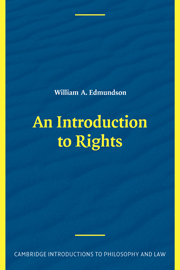Book contents
- Frontmatter
- Contents
- List of Tables
- Preface
- Part One The First Expansionary Era
- Part Two The Second Expansionary Era
- 6 The Universal Declaration, and a Revolt Against Utilitarianism
- 7 The Nature of Rights: “Choice” Theory and “Interest” Theory
- 8 A Right to Do Wrong? Two Conceptions of Moral Rights
- 9 The Pressure of Consequentialism
- 10 What Is Interference
- 11 The Future of Rights
- 12 Conclusion
- Bibliographical Notes
- References
- Index
11 - The Future of Rights
Published online by Cambridge University Press: 08 January 2010
- Frontmatter
- Contents
- List of Tables
- Preface
- Part One The First Expansionary Era
- Part Two The Second Expansionary Era
- 6 The Universal Declaration, and a Revolt Against Utilitarianism
- 7 The Nature of Rights: “Choice” Theory and “Interest” Theory
- 8 A Right to Do Wrong? Two Conceptions of Moral Rights
- 9 The Pressure of Consequentialism
- 10 What Is Interference
- 11 The Future of Rights
- 12 Conclusion
- Bibliographical Notes
- References
- Index
Summary
We have been exploring the twentieth-century effort to understand the nature of rights and to locate their moral footing. But this intellectual enterprise is at best only a part of the story. As we noted in Chapter 11, the 1948 Universal Declaration of Human Rights inaugurated a second expansionary period of rights discourse. The expansionary tendency of rights discourse was held in check for at least a decade and a half, however, by the global standoff between the West and the Soviet Bloc – the Cold War. Owing, in part, to the expanse of the rights set forth in the 1948 Universal Declaration, both sides in the Cold War could draw on the Universal Declaration for propaganda purposes. The West emphasized the denial of political rights in the Communist world, while the Communists pointed to the economic insecurity and inequality tolerated in the West, as well as the residual injustices of colonialism – including apartheid in Africa and racial segregation in the southern United States. Given the tension and hostility between the parties, there was more than ample incentive to propagandize. A seeming stalemate between propaganda and counter-propaganda was broken, however, by a series of developments, which included decolonization by the Western powers, the dismantling of official racial segregation in the United States, and the diplomatic isolation of apartheid South Africa.
- Type
- Chapter
- Information
- An Introduction to Rights , pp. 173 - 192Publisher: Cambridge University PressPrint publication year: 2004
- 1
- Cited by

